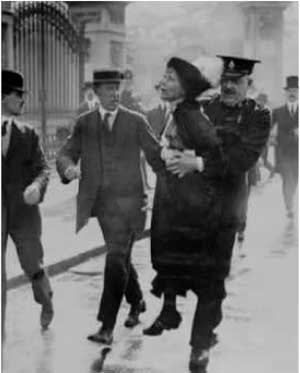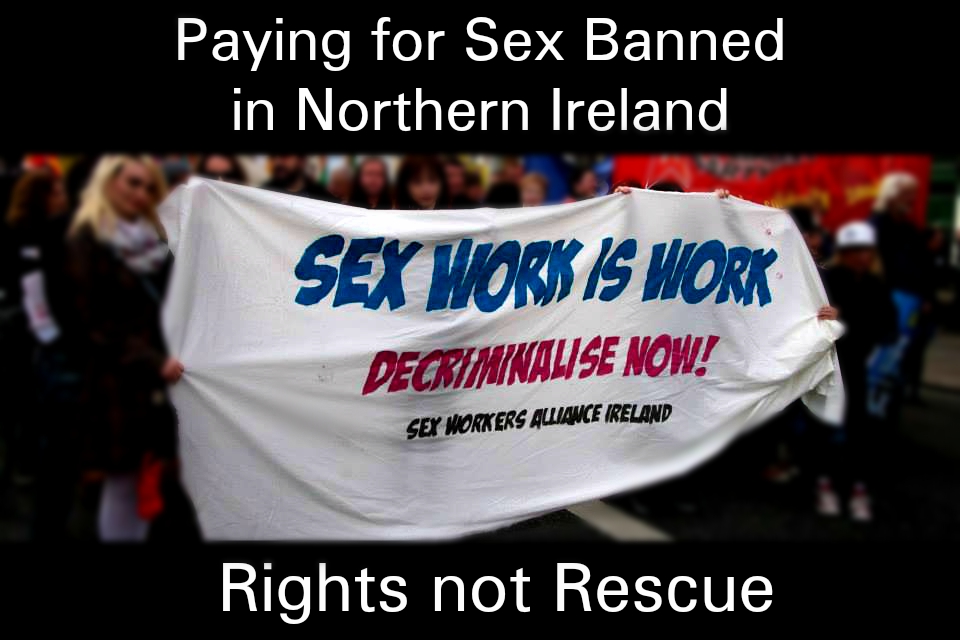Over 30 years of anarchist writing from Ireland listed under hundreds of topics
Sex work
Towards Womens Freedom
The WSM's collectively agreed position on women's freedom as amended by the July 2017 WSM National Conference. This position paper sits under the Sex, Gender, and Sexuality paper and does not repeat that material here.
Towards Women's Freedom
A Workers Solidarity Movement Position Paper
Sex Work as Work - Dr. Laura Agustín at the Dublin anarchist book fair
 Dr. Laura Agustín (author of Sex at the Margins: Migration, Labour Markets and the Rescue Industry) talked at the 2013 Dublin Anarchist Bookfair about why she believes sex work should be treated as work and why we should “resist the general victimising of women who sell sex”.
Dr. Laura Agustín (author of Sex at the Margins: Migration, Labour Markets and the Rescue Industry) talked at the 2013 Dublin Anarchist Bookfair about why she believes sex work should be treated as work and why we should “resist the general victimising of women who sell sex”.
Turn off the Red Light: Should we advocate it?
 “In Turn off the Red Light – Should We Advocate It?”, T.J., explores the problems faced by sex workers in gaining recognition by those who normally fight for workers rights and outlines how criminalisation of demand has created new problems in countries where that has been introduced.
“In Turn off the Red Light – Should We Advocate It?”, T.J., explores the problems faced by sex workers in gaining recognition by those who normally fight for workers rights and outlines how criminalisation of demand has created new problems in countries where that has been introduced.
Sex and Sex Work from an Anarcha-Feminist perspective
 In “Sex and Sex Work from and anarcha-feminist perspective”, Leticia looks at the theoretical background to the debate between those who argue for decriminalisation and those who “see sex work (or even sex in general) as violence against women”. She argues that because sex is commodified, sex workers should be treated in the same way as others who engage in exploitative labour.
In “Sex and Sex Work from and anarcha-feminist perspective”, Leticia looks at the theoretical background to the debate between those who argue for decriminalisation and those who “see sex work (or even sex in general) as violence against women”. She argues that because sex is commodified, sex workers should be treated in the same way as others who engage in exploitative labour.
Authoritarianism and the early Irish State
 Fin Dwyer looks at the latter years of Ireland’s first post independence government, which having successfully suppressed political opposition and the workers’ movement, went on to “attack women and enforce their moral and ethical values on wider society”. From the clearing of prostitutes from the Monto and the filling of the Magdalene laundries to the institutionalisation of child abuse, he describes how the state’s close association with the Catholic Church played a decisive role in forming attitudes to women and sex that have had a devastating effect on Irish society that can still be felt today.
Fin Dwyer looks at the latter years of Ireland’s first post independence government, which having successfully suppressed political opposition and the workers’ movement, went on to “attack women and enforce their moral and ethical values on wider society”. From the clearing of prostitutes from the Monto and the filling of the Magdalene laundries to the institutionalisation of child abuse, he describes how the state’s close association with the Catholic Church played a decisive role in forming attitudes to women and sex that have had a devastating effect on Irish society that can still be felt today.
Homelessness & Prostitution - Legalisation not criminalisation
The sex industry is expanding and is said to gross millions of pounds per annum. Over the last year this has been reflected in the increasing focus in the media on prostitution. In October, a brothel keeper was arrested and charged. In November, Young Fine Gael passed a motion supporting the legalisation of prostitution. It is now a popular topic on the late night chat shows on tabloid radio stations.This summer, an inevitable tragedy happened. As a result of having to work unprotected on the street Sinead Kelly, a young Dublin prostitute, was murdered as she worked. Politicians and high-ranking cops shed crocodile tears for the cameras. Few of them pointed out that it was their stringent laws that made Sinead Kelly an easy target.
Dublin Brothel Pickets - Stigma is Not the Solution
Why have there been pickets outside massage parlours on Dorset St? Do they really pose any danger? Do these protests help those who work there, or actually make them more afraid and isolated? Watch the video below.
Sex Work 101 - Talk by Anarchist Sex Worker in Ireland - Audio
This is the audio of a talk – Sex Work 101 - given by a member of the Workers Solidarity Movement after a WSM Dublin branch meeting in April 2017.
Stormont Bans Paying for Sex Work
T oday in the North of Ireland it will become illegal for people to pay for sex work.
oday in the North of Ireland it will become illegal for people to pay for sex work.
In spite of protests by sex workers and their allies Stormont has ignored their voices.
Despite 98% of sex workers who were surveyed by the Department of Justice last year coming out against the bill, 81 MLAs (out of 108) voted in favour of it. This represents a complete contempt towards sex workers as they struggle for labour rights.
The new law is extremely irresponsible and it will do nothing to protect sex workers; it will only drive them further underground and put them in more danger. Banning the purchase of sex isn't going to stop it happening and it would be foolish to think so.
The Minister, Sex Work and Asylum Seekers in direct provision centres in Ireland
Minister Frances Fitzgerald claimed to be shocked at reports that some women in direct provision centres felt compelled into sex work by the poverty they are kept in. How can that be, it's Minister Frances Fitzgerald who actually operates this direct provision system that creates such circumstances.
As the Minister she does not allow asylum seekers to work, leaving them to exist on €19.10 per week, often for periods measured in years. Who can imagine living month after month with such a minuscule amount of spending money? And while she now wants to suggest she has concern for such women the reality is that she is the one who signs deportation orders, orders which will very often send the same women to very much more difficult circumstances.

